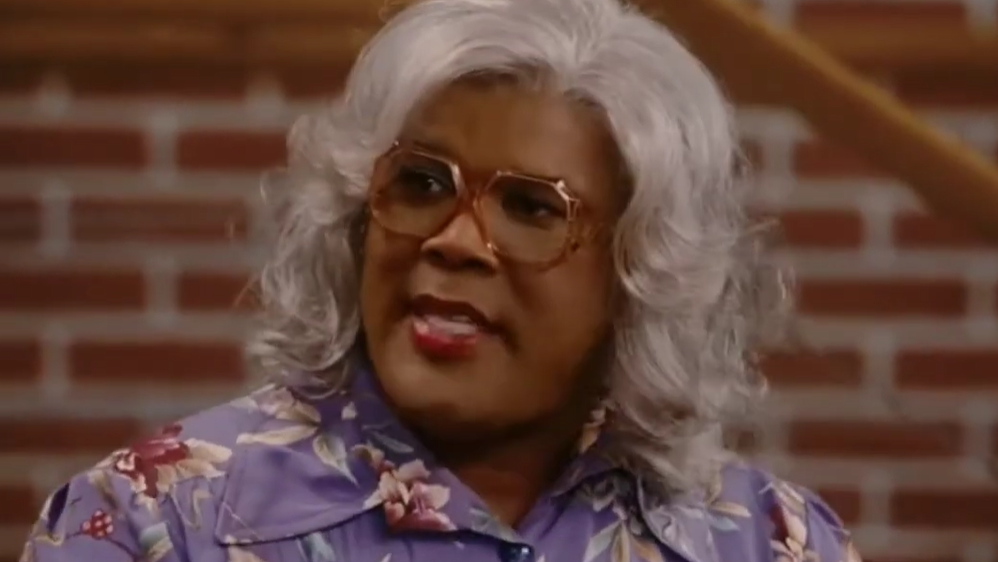Few characters have had as lasting an impact as Madea’s pious, grounded, and often conflicted daughter, Cora Jean Simmons. Cora has long been the voice of reason in a franchise that is based on comic mischief and moral chaos. However, when analyzed across stage plays, television series, and movies, her origin story is full of unexpectedly intricate and emotionally nuanced turns.
Although Cora was first presented as the daughter of Leroy Brown and Mabel “Madea” Simmons, their relationship has changed significantly over time. She recognizes Brown as her father in previous plays and shows him affectionate devotion. However, a DNA test in Madea’s Big Happy Family reveals the startling fact that Brown is not her biological father. Fans’ perceptions of her familial placement have been drastically altered by this plot twist, despite its humorous delivery.
Tyler Perry accomplished something especially novel by weaving that revelation into the plot of the movie. He urged the audience to reevaluate their presumptions regarding ancestry, identity, and belonging. And he did it while upholding Cora’s moral principles, which have remained constant despite the revision of her past.
Cora Jean Simmons – Character Overview
| Attribute | Details |
|---|---|
| Full Name | Cora Jean Simmons |
| Portrayed By | Tamela Mann |
| First Appearance | I Can Do Bad All By Myself (1999 Stage Play) |
| Mother | Mabel “Madea” Simmons |
| Presumed Father | Mr. Leroy Brown (not biological, confirmed via paternity test) |
| Date of Birth | 1953 (approximate, varies by storyline) |
| Children (Plays only) | Lisa, Tina, Darlene, Laura, Robin, Ellie |
| Grandchildren (Plays) | Shemar, TiTi, Malik, Timothy |
| Occupation | Schoolteacher (plays), Church worker (TV series) |
| Religion | Devout Christian |
| Personality Traits | Kind-hearted, moral compass, spiritual, nurturing |
| Notable Relationships | Brown (father figure), Madea (mother), family through various spin-offs |
| Reference Link | Cora Simmons – Madea Wiki |

Depending on the platform, Cora’s persona has changed over time. She is depicted in the original stage plays as a middle-aged mother who managed widowhood while raising her two daughters, Lisa and Tina. She is frequently seen imparting divine knowledge to nieces, grandchildren, and even her own children by the time she is in her late forties or early fifties. Notably, the TV version never features her children.
That’s a crucial distinction. Cora’s past is very different in the television show Meet the Browns. In contrast to her more experienced and maternal presence in the stage plays, she is childless, younger, and emotionally naïve. This has produced a contradiction that, to keen fans, seems perplexing at first but intriguing upon closer examination.
Tyler Perry appears to have a deliberate approach. He reshapes Cora according to the needs of the narrative, much like a painter might revisit a portrait with fresh brushstrokes. Although at times perplexing, this flexible strategy has enabled Perry to access more emotional ground. For example, Cora’s delayed romantic experience lends an air of innocence in the series, while her role as a mother emphasizes her emotional depth and resilience in the plays.
Such dynamic storytelling is indicative of a broader trend in entertainment where long-running characters undergo sometimes drastic changes. Characters like Tony Stark from the Marvel movies and Meredith Grey from Grey’s Anatomy are examples of this. This heritage is reflected in Cora, whose identity changes throughout various stories to explore new emotional terrain.
Communities where family structure isn’t always linear find great resonance in the emotional depth of Cora’s story. Her story serves as a reminder to many that biology does not always define identity, love, or parenthood. Cora never stops being close to Mr. Brown, even after discovering that he isn’t her biological father. Rather, she welcomes the connection, reinforcing a reality that blended families are all too familiar with: parenthood is about presence, not just genetics.
Even after discovering that Brown is not her biological father, Cora’s devotion to him is incredibly evident. It gently teaches viewers that love, tolerance, and spiritual ties—rather than just genetic ties—can build relationships. This message is especially effective for communities dealing with adoption and stepparenting or recovering from generational trauma.
Additionally, the plots involving Cora have a larger social function. Cora provides emotional clarity and spiritual equilibrium in contrast to Madea’s brazen, unrepentant demeanor. She talks quietly but deliberately. She may not be as skilled with a gun as her mother, but she certainly touches people’s emotions, and that has a greater effect in many respects.
It’s also important to note how Cora has developed into a representation of poise under duress. While Cora relies on prayer, faith, and quiet perseverance, Madea uses chaotic, even aggressive, methods. With one daughter standing in for fire and the other for water, this duality produces a remarkably captivating storyline that keeps changing with every new episode.
These changing dynamics are more than just amusement for franchise fans; they are noticeably better representations of the contemporary African-American family. Tyler Perry has created a world that is relatable by demonstrating to us that family is chaotic, non-linear, and frequently contradictory. Cora is an anchor, not just a fictional character. She provides the kind of love that only requires acceptance and doesn’t require an explanation.
Cora makes a reappearance in the most recent installment of the franchise, Madea’s Destination Wedding, where she skillfully navigates another family drama with her trademark combination of conviction and patience. It serves as a reminder that although the plots may vary, her character’s core is always present.
Cora’s story offers a particularly useful analysis of how narrative flexibility can represent the complexity of real life through the prism of popular culture. She has also grown to be one of Tyler Perry’s most enduring characters by remaining kind and gracious despite the comedic chaos.
